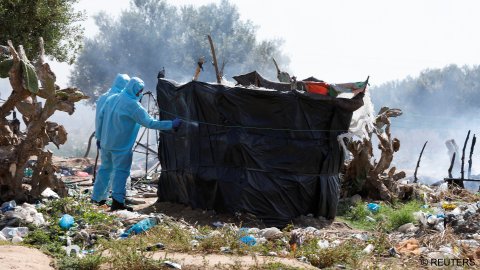Tunisia’s Controversial Decision: Authorities Ignite Migrant Camp Destruction
In recent days, Tunisia has found itself at the center of a heated debate regarding immigration policy and the treatment of migrants. The decision by local authorities to set fire to a migrant camp has sparked outrage among human rights organizations, activists, and the international community. This event not only raises questions about the humanitarian approach towards migrants in Tunisia but also highlights the broader challenges faced by nations grappling with migration issues.
The Context of the Migrant Crisis in Tunisia
Tunisia has long been a transit country for migrants seeking better opportunities in Europe. Many individuals from sub-Saharan Africa, as well as other regions, view Tunisia as a stepping stone towards their ultimate destination. The country has experienced an influx of migrants fleeing conflict, poverty, and persecution, leading to a complex humanitarian crisis.
Challenges Faced by Migrants
Migrants in Tunisia often encounter numerous challenges, including:
As the number of migrants continues to rise, the Tunisian government is faced with mounting pressure to manage the situation effectively while balancing humanitarian concerns and national security.
The Incident: Fire at the Migrant Camp
The decision to set fire to a migrant camp, reportedly as part of an effort to dismantle it, has drawn widespread condemnation. Local authorities justified their actions by citing concerns over safety and hygiene. However, many critics argue that such measures are inhumane and constitute a violation of the rights of vulnerable individuals seeking refuge.
Human Rights Violations
The destruction of the camp raises significant human rights concerns, including:
Human rights organizations have expressed alarm over the implications of this incident, calling for accountability and a reevaluation of Tunisia’s immigration policies.
International Reactions and Implications
The international community has responded with concern regarding Tunisia’s treatment of migrants. Numerous human rights organizations, including Amnesty International and Human Rights Watch, have condemned the actions of the Tunisian authorities. Calls for investigations and accountability have emerged, with many urging the government to adhere to international human rights standards.
Impact on Tunisia’s International Relations
Tunisia’s actions could have significant repercussions for its relationships with other nations, particularly those in Europe that are grappling with similar migration issues. The country has been a partner in various agreements aimed at curbing irregular migration, but incidents like the camp fire may undermine its credibility and commitment to human rights.
Additionally, this situation may impact Tunisia’s ability to attract foreign investment and support from international organizations. Countries and agencies that prioritize human rights may reconsider their partnerships with Tunisia if the government continues to adopt harsh measures against vulnerable populations.
The Path Forward: Addressing the Root Causes of Migration
To mitigate the ongoing migrant crisis, it is essential for Tunisia to adopt a more compassionate and comprehensive approach. This includes:
By taking proactive measures, Tunisia can create a more supportive environment for migrants while maintaining its international obligations and improving its standing in the global community.
Conclusion: A Call for Change
The recent incident involving the destruction of a migrant camp in Tunisia has brought to light the urgent need for a reevaluation of the country’s approach to immigration and migrant rights. As the global migration crisis continues to evolve, it is imperative for nations like Tunisia to prioritize humanitarian concerns and uphold the principles of human dignity.
In the face of adversity, it is crucial for both local authorities and the international community to collaborate and find sustainable solutions that respect the rights of all individuals, regardless of their migration status. The path forward requires compassion, understanding, and a commitment to addressing the underlying issues that drive people to leave their homes in search of a better future.










